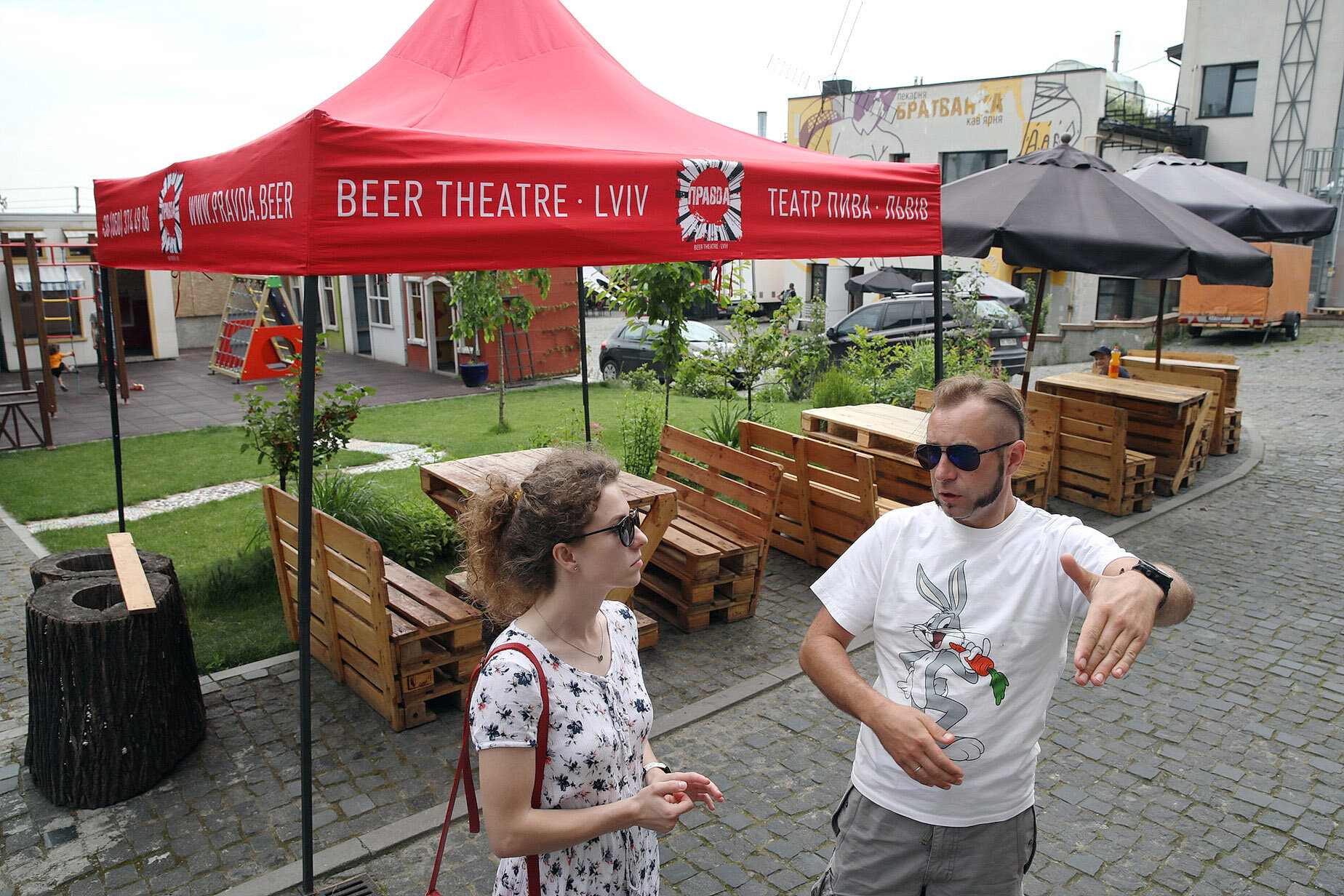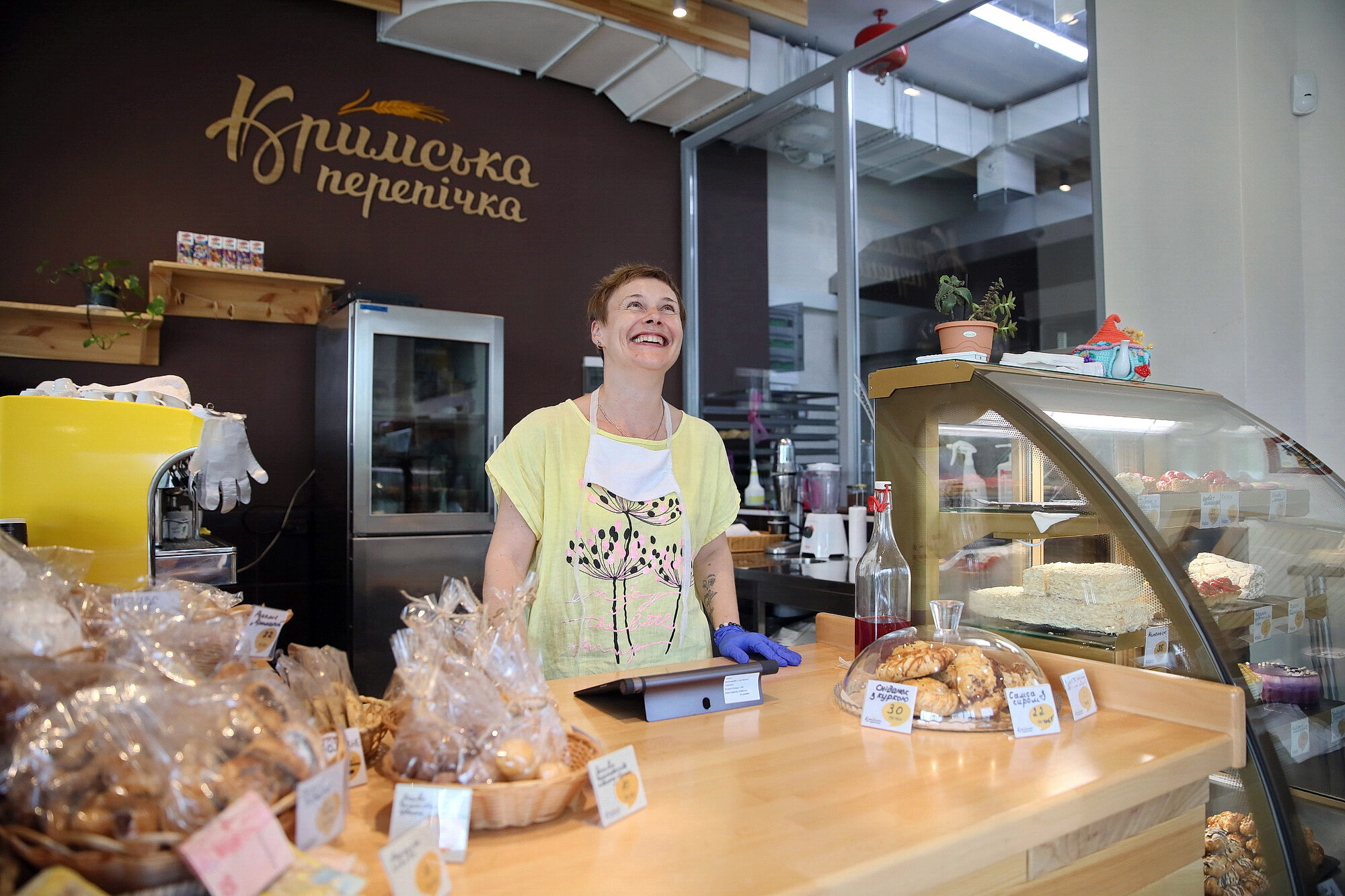LVIV, Ukraine — The coronavirus pandemic has been a disaster for the food and drink sector that was forced to shut down for two months of strict lockdown. Although most restrictions have been lifted by now, the infection numbers are growing in Ukraine. And running a restaurant amid this epidemic is a challenge.
This is particularly the case in Lviv, the largest city in western Ukraine, which reopened businesses and travel, despite having the highest number of active COVID-19
cases in the country. There were over 9,200 of them in Lviv Oblast as of July 29.
Lviv’s major restaurant network,iFest, cooperated with the city authorities in developing a new safety protocol for eateries. It includesa limited number of customers per square meter, distance between tables, body temperature checks at entrances, mask wearing, frequent disinfection and QR code stickers instead of paper menus.
In addition, the company created an internal sanitary service that inspects how its employees obey the rules and monitors the health of workers.
“The father of one of our cooks got sick with the coronavirus. The staff who came into contact with him had to self-isolate and get tested. We had to find replacements for them,” iFest co-founder Yuriy Nazaruk told the Kyiv Post, describing the new working reality.
“It makes our work more complicated. But we have no other options.”
Across Ukraine, 56% of food and drink establishments closed down in the first two months of the quarantine imposed in mid-March to curb the spread of COVID-19,
according to Opendatabot, an open data monitoring platform, and restaurant management service Poster.
Some restaurants switched to food delivery and takeaway services, but most of them still were forced to lay off workers and lost profit.
By July, 88% of food and drink venues had reopened after the Ukrainian government allowed limited on-site dining — first outdoors and, later, indoors.
Those establishments that survived the lockdown now have to find a balance between the safety of their staff and customers and the financial struggle to stay afloat.

Yuriy Nazaruk (R), co-founder of iFest Holding, talks with an employee about plans for redevelopment of a festival space adapting to the coronavirus in Lviv on July 2, 2020. (Photo by Volodymyr Petrov)
iFest wades through crisis
The most painful part of the quarantine was having to furlough some 1,800 employees, iFest’s Nazaruk said.
The lockdown affected virtually all businesses in the vast portfolio of iFest, which owns many iconic Lviv dining establishments and widely recognizable Ukrainian brands whose fame transcends the city: Drunken Cherry, Lviv Handmade Chocolate and Pravda Brewery.
Founded in 2007 with one restaurant in Lviv, the holding has since grown its network to several dozen restaurants, coffee shops, bars and cafeterias. It expanded countrywide to Chernivtsi, Kyiv, Kharkiv, Ivano-Frankivsk and Odesa, as well as abroad — to Moldova and Poland.
In mid-March, however, all of them had to shut down.
Moreover, as borders closed and travel ground to a halt, the holding’s new hotel had to be closed and its city tours stopped. With mass events banned, its catering service and festival space had no work.
What helped iFest withstand the crisis was its diverse business and partners who temporarily canceled the rent, Nazaruk said.
A chain of convenience stores, which Nazaruk says iFest viewed as its non-core assets, turned out to be the only business that was allowed to stay open as an essential service during the lockdown.
Two schools run by iFest switched to remote learning. The Aviatsya Halychyny clothing brand began sewing masks, and Old Lion Publishing House focused on online sales of books.
Some iFest employees sewed masks at home or delivered food.
Since the reopening, the holding has been able to gradually hire people back. But a true rebound is unlikely this year. iFest restaurants and bars are located in Lviv’s historic city center and rely on tourist traffic. Without tourism and mass events, the owners are content even if a business just makes enough money to cover salaries and operating costs.
“I don’t think we will make any profit this year. Now it is important for us to weather the storm and keep the majority of our employees,” Nazaruk said. “It’s survival and preservation mode.”
The holding plans to repurpose its festival space, iFest Republic, into a destination for family leisure. It’s unclear how long a ban on mass events will be in place, and spacious open-air recreation areas are in demand.

Oksana Novikova, owner of Crimean Bakery, speaks with the Kyiv Post at her bakery in Lviv on July 3, 2020. (Photo by Volodymyr Petrov)
Crimean Bakery hopes to survive
Oksana Novikova runs a small family business in Lviv — two bakeries, which stayed open during the lockdown.
Both of her shops, called Crimean Bakery, are located in a densely populated residential area far from the city center where families with children live. They were the core clients of the bakeries.
Novikova left her native city of Simferopol for Lviv in May 2014, after Russia unlawfully annexed Crimea. She had to abandon a successful business in the procurement of ingredients for bakeries and start from scratch in a new place.
She opened the first Crimean Bakery with her husband and sister in December 2015 inside a shopping center. Four years later, she opened a second bakery inside a residential complex.
Besides selling bread, pastries, cakes and coffee, the bakeries had seating and offered some activities, such as an English club and a play area for children.
When the lockdown was imposed, Novikova closed the seating area and served takeaway. She also furloughed the employees who lived outside of the city and had difficulty commuting to work.
“It was hard mentally. The whole world was put on hold,” Novikova said, recalling those days in an interview with the Kyiv Post.
But the hardest has been the financial blow.
The shopping mall owner gave Novikova a discount on rent which was “insignificant but pleasant.”
In the first two weeks of the quarantine, the bakeries’ earnings fell by 65%. Overall, in three months of restrictions, their income fell almost by half, and the bakeries barely covered their operating costs.
During the lockdown, customers ordered home delivery and bought more bread. It hardly helped. “You have to be a huge bread-baking plant to make any money on bread,” Novikova said.
In April and May, the bakeries managed to break even thanks to the holiday sales of pastries on Easter and Mother’s Day.
The crisis has deepened since June. While summer is a hot season for tourist-oriented businesses, for bakeries in residential areas like Novikova’s, business is slow. People leave for vacations, for their home villages or for seasonal work abroad.
Not only have there been fewer customers, but demand for pastries has been low and the average check has reduced.
“We don’t make any profit now. We are living off savings from the previous years,” Novikova said, adding that she has to think of promotion and other ways to get back to where they were.
“Fortunately, we kept our staff of 26 people,” she said. “I hope we will survive this crisis.”
